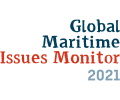

Senior leaders foresee environmental issues to have the most impact in the coming decade for the global maritime industry, particularly as related to decarbonization and new regulations. This is a key finding of the Global Maritime Issues Monitor 2021, published today by the Global Maritime Forum; Marsh Specialty, part of global insurance broker and risk advisor Marsh; and the International Union of Marine Insurance. Survey respondents from six continents highlight ‘decarbonization of shipping’, ‘new environmental regulation’, ‘societal demands for sustainability’, and ‘failure of climate-change mitigation and adoption’ as four of the top 10 issues in terms of potential impact on the maritime industry.
Top issues: Decarbonization and other environmental issues come to the fore
For the first time in the four-year history of the Global Maritime Issues Monitor, decarbonization of shipping is seen by respondents as the most impactful issue, followed by new environmental legislation.
Issues linked to decarbonization and climate change score high on impact and likelihood this year when top issues regarding likelihood, impact and preparedness are compared. The focus in 2021 is a shift back to the pre-pandemic world of 2019, where environmental issues led much of the discussion of the survey.
Conversely, respondents show more confidence in 2021 in some financial areas, and it is noticeable that economic and geopolitical issues this year were overshadowed for the first time.
“This year, environmental issues are clearly top of mind for the marine industry, with decarbonization of shipping and new environmental regulation listed as the main concerns. Worryingly, they still perceive the maritime industry as relatively unprepared to handle these issues, underlining that when it comes to decarbonization, government action and collaboration with the private sector is needed to deliver the right enabling environment for shipping decarbonization,” says Kasper Søgaard, Managing Director, Head of Institutional Strategy and Development at the Global Maritime Forum.
Low preparedness on environmental, digital and talent issues
Where sustainability and environmental issues score high on impact and likelihood, they score low on preparedness.
In addition, survey respondents cited issues relating to cyberattacks, geopolitics, global economic crisis, and digitalization as being of particular concern. The issues of cyberattacks and data theft are for example seen as both more impactful and more likely this year than last. At the same time respondents feel the industry is not fully prepared to tackle them, while the likelihood is that cyberattacks in the marine industry will continue to increase.
“There is a clear shift in perception among respondents of their organisations’ preparedness to handle cyberattacks, which correlates with ransomware incidents increasing both in intensity and frequency over the last 12 months. With a growing reliance on technology and ever-greater digitalization in the shipping sector, the industry needs to take
a more comprehensive approach to address the cyber threats it faces, otherwise it is increasingly exposed to risks that could cause great harm to their operations,” says Marcus Baker, Global Head of Marine and Cargo at Marsh Specialty.
Another issue area that appears higher on the respondents’ list of concerns this year concerns talent shortages. The impact and likelihood of workforce and skill shortages rank higher in the survey this year, while respondents feel the industry is less prepared to manage these issues. This is likely connected to the impact of the pandemic on seafarers, who in many instances have been unable to return home due to covid restrictions.
Deep dive on climate policy and maritime transport: Pricing of GHG emissions viewed as first step The Issues Monitor’s deep dive on climate policy and maritime transport – which looks at different policy options available to regulators and the industry’s perception of them – reveals that the respondents see a price on
greenhouse gas (GHG) emissions as the most effective climate policy, and the most likely to be implemented. A
global price on GHG emissions took the first spot in terms of impact, but a regional or domestic price is seen as more likely to be adopted.
“Our survey respondents clearly prefer global to regional regulation. Now is an important time in the shipping industry’s effort to better prepare for decarbonization and new environmental regulation, and regulation at a global level will help create a more level playing field between the actors of the industry. However, our qualitative research also suggests that a regional approach could be made complementary to a global one and spur the investments and innovations necessary to reach net-zero,” says Richard Turner, President of the International Union of Marine Insurance.
Across all policies, regulatory measures, such as a price on GHG emissions and fuel mandate, are seen as more likely to be implemented than incentives such as vessel and fuel subsidies. A global and/or regional fuel mandate is seen as the second most impactful climate policy, behind a price on emissions. Zero emission vessel and fuel subsidies are viewed as less effective than both.
When asked about the impact and likelihood of IMO adopting a target to reduce total GHG emissions from international shipping by 100% by 2050, 86% of respondents say such a target would have an important impact, but only 23% believe it is very likely to be adopted.
Source: Global Maritime Issues Monitor 2021